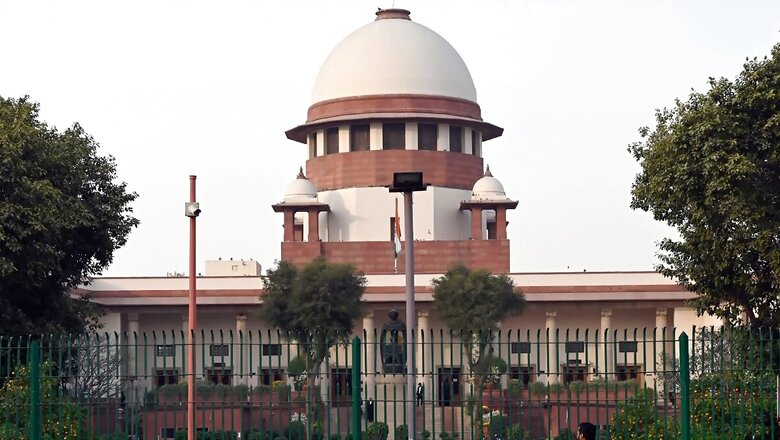
views
The Supreme Court on Monday laid down detailed guidelines for the constitutional courts to examine legality of preventive detention orders, while noting a “pernicious trend” by the Telangana police to curb liberty and freedom.
A bench of Justices Surya Kant and Dipankar Datt expressed serious concern over mechanical approach by the authorities to pass “reckless detention” orders for a maximum period of 12 months without the necessary safeguards.
“It requires no serious debate that preventive detention, conceived as an extraordinary measure by the framers of our Constitution, has been rendered ordinary with its reckless invocation over the years as if it were available for use even in the ordinary course of proceedings,” the bench said.
“To unchain the shackles of preventive detention, it is important that the safeguards enshrined in our Constitution, particularly under the ‘golden triangle’ formed by Articles 14 (equality), 19 (freedom) and 21 (life and liberty) of the Constitution, are diligently enforced,” the bench added.
The court stressed that the detaining authority ought to ensure that the order does not manifest consideration of extraneous factors.
“The detaining authority must be cautious and circumspect that no extra or additional word or sentence finds place in the order of detention, which evinces the human factor — his mindset of either acting with personal predilection by invoking the stringent preventive detention laws to avoid or oust judicial scrutiny, given the restrictions of judicial review in such cases, or as an authority charged with the notion of overreaching the courts, chagrined and frustrated by orders granting bail to the detenu despite stiff opposition raised by the State and thereby failing in the attempt to keep the detenu behind bars,” the bench said.
The apex court quashed the detention order passed on March 24, 2023 and upheld by the High Court on June 28, 2023 an appeal filed by Ameena Begum against the action initiated against her husband.
The court noted the police passed the detention order against the man terming a ‘Goonda’ for his involvement in five FIRs.
The bench found a “pernicious trend prevalent” in Telangana. “While the nation celebrates Azadi Ka Amrit Mahotsav to commemorate 75 years of Independence from foreign rule, some police officers of the said state who are enjoined with the duty to prevent crimes and are equally responsible for protecting the rights of citizens as well, seem to be oblivious of the fundamental rights guaranteed by the Constitution and are curbing the liberty and freedom of the people. The sooner this trend is put to an end, the better,” the bench said.
Looking at the facts of the case, the bench said on an overall consideration of the circumstances, it does appear that the existing legal framework for maintaining law and order is sufficient to address offences, which the Commissioner of Police anticipates could be repeated by the detenu if not detained.
“Preventive detention laws—an exceptional measure reserved for tackling emergent situations—ought not to have been invoked in this case as a tool for enforcement of “law and order”. This, for the reason that, the Commissioner despite being aware of the earlier judgment and order of the High Court dated 16th August, 2021 passed the Detention Order ostensibly to maintain “public order” without once more appreciating the difference between maintenance of “law and order” and maintenance of “public order”. The order of detention is, thus, indefensible,” the bench said.
The court underscored that the period of detention ought to necessarily vary depending upon the facts and circumstances of each case and cannot be uniform in all cases.
“Detention being a restriction on the invaluable right to personal liberty of an individual and if the same were to be continued for the maximum period, it would be eminently just and desirable that such restriction on personal liberty, in the least, reflects an approach that meets the test of Article 14,” the bench said.
The bench also said the regular practice of the authorities treating the maximum period of detention of 12 months as the standard duration could be suggestive of a mechanical approach.
“Having observed the uncanny consistency of authorities continuing detention orders under the preventive detention laws for the maximum permissible span of 12 months from the date of detention as a routine procedure, without the barest of application of mind, we think that it is time to say a few words with a view to dissuade continuation of detention orders till the maximum permissible duration unless some indication is provided therefor by the concerned government in the confirmation order,” the bench said.
















Comments
0 comment